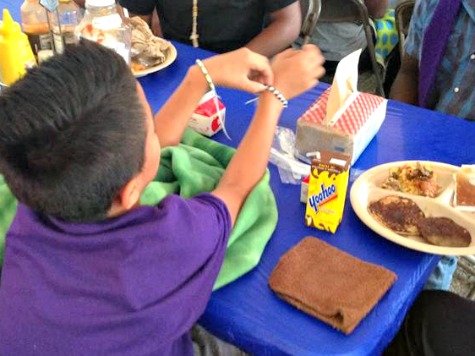Building 267 at Naval Base Ventura County, which previously served as a processing facility for navy sailors on their way to sea, is now being used to house 180 children from Central America who were stopped by U.S. border patrol agents illegally crossing the Texas border.
The Los Angeles Times reports that, by early next week, the number of children to be housed at the Port Hueneme location will reach its maximum capacity of 575. It is predicted that, this year alone, up to 90,000 minors, unaccompanied by adults, will cross the southwest U.S. border and will be cared for at a cost exceeding $2 billion to U.S. taxpayers.
According to the Obama administration, the feeding and caring of the children at the Port Hueneme facility is considered to be a response to a “humanitarian crisis” on the country’s borders. Southwest Key, a social services not-for-profit contractor, is overseeing the operation. Reporters were allowed to view the large warehouse, which is encompassed by a chain-link fence, but were told not to talk to the children or take pictures.
The Times reported that the daily activities for the children commence at 5:45 a.m. and include time for physical education, classes, showering, movies and TV, then lights-out at 9:30 p.m. Dinners are well balanced: vegetable lasagna, meatballs, sautéed zucchini, and parsley bread were enjoyed at Thursday’s meal. Inside the facility, there are plenty of games to keep the controversial visitors occupied, including ping-pong and foosball. The game room is appointed with comfortable couches.
The TV was dominated by World Cup soccer play most of the day, as a group of boys watched the match between Croatia and Brazil, expressing enthusiasm when a goal was scored. The girls were occupying themselves with art projects, one of which was the painting of a Guatemalan flag with their names on it.
Along with 24-hour laundry service, clean bathrooms, and comfortable beds adorned with colorful blankets, there are 45 Spanish-speaking social workers helping the children locate family members in the U.S. A child can be released to a family member if they agree to take the child to an immigration status hearing later.

COMMENTS
Please let us know if you're having issues with commenting.